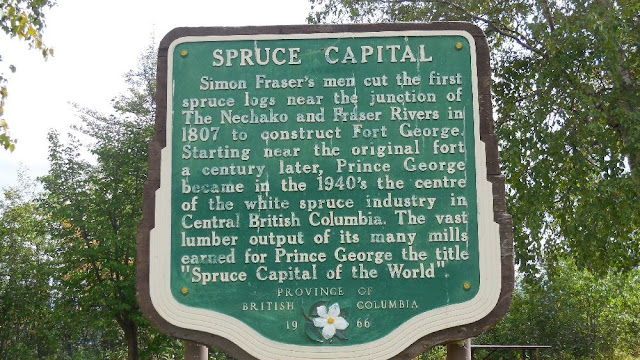Well we’re finally home from the Alaskan trip after 4 ½
months. We drove 9,630 miles with the motorhome and 2,740 miles with the car.
This included seeing our daughter Michelle and her family near Seattle and our
son and his family in Sacramento. It also included staying on our boat in
Brisbane, CA for several weeks. Following that we then headed north, yes north
as that is not a typo, to the Dry Creek area for some wine tasting. We meet our
friends the Sloans from Sun Lakes there and had a great time. Then we went back
to Sacramento before heading south to Semi Valley there we had dinner with Ruth
Jacob (or son in laws mother) and her other son Todd. Then we headed east to Quartzsite,
AZ and then to Sun Lakes.
We had talked about driving to Alaska for several years.
Then we bought another rig and it was just too nice for those roads. But in the
end insanity won out and we headed up north to cross this one and only trip to
Alaska off of our Bucket List.
But somewhere around Fairbanks we began to realize that
we were on a very exciting and unique adventure and first one of us and then
the other said “We could come back a second time!” and we may just do exactly
that! After all we now know what we missed on the first trip.
Although we saw some very exciting and beautiful parts of
Alaska we were confined to a very small portion by the roads. You can’t even
drive to Juneau the capital of Alaska. You can take a ferry, boat, canoe or
airplane but you can’t drive there. You could probably take a sled dog team
there and in fact this is another way to reach much of this far North Country.
I’d love to take a sled dog team for perhaps a mile in the winter but I’ll
leave the 1,000 mile Iditarod Trail to the professionals.
Northern Canada is even more remote. In Yukon with a
population of 36,000 and 186,272 square miles you can meet one person every 5
square miles – how’s that for a big front yard?
We didn’t see huge numbers of animals just like we read –
go to Yellowstone for that experience. But the ones we saw were wild and on
their turf – moose, beaver, horses, bears, elk and more. At Deep Creek Beach we
watched eagles soar for hours. Also saw a few “wild” Alaskans but everyone we
meet was friendly! One of the things an Alaskan woman will tell you is that in
the smaller areas there are about 8 males to one woman. So your odds are good at
meeting someone…but the goods are odd!
One of the most interesting animals was the Wood Bison which was actually in an enclosed fence. This is a huge massive animal (the largest living animal in North America) and
there is no question that if they wanted to go through the fence they could.
These animals which weigh up to 2,200 pounds are unique to the far north with five historical grazing areas in
Alaska. They are well adapted to the cold harsh environment and survive where
the pains bison would perish. They were believed to be extinct before some were found in Canada. In about 2002 Canada sent thirteen of these animals to the Alaskan Wild
Life Conservation Center south of Anchorage. The herd has grown to about 150 animals and are to the point where they
can begin to survive on their own. The release of the animals to their native grazing
areas is set to begin in 2014. What a great success story.
There is just so much to see, hear and experience in Canada and Alaska.
There is just so much to see, hear and experience in Canada and Alaska.
Well that’s our trip and we’re going back! Below are maps
showing the stops on our trip. Stop 13 on the map is Dawson Creek and the
beginning of the Alaskan Highway, stop 21 is Delta Junction the end of the
Alaskan Highway. Some other stops: Fairbanks – 22, Denali – 23, Talkeetna – 24,
Portage Valley on the road to Whitter – 26, Seward – 27, Homer – 30, Valdez –
38, Tok – 41, Haines – 44, Skagway – 45 and Hyder – 48.
Our Overall Route
The Alaskan Highway Including SE Alaska
Fairbanks, Anchorage and the Kenai Peninsula





















































